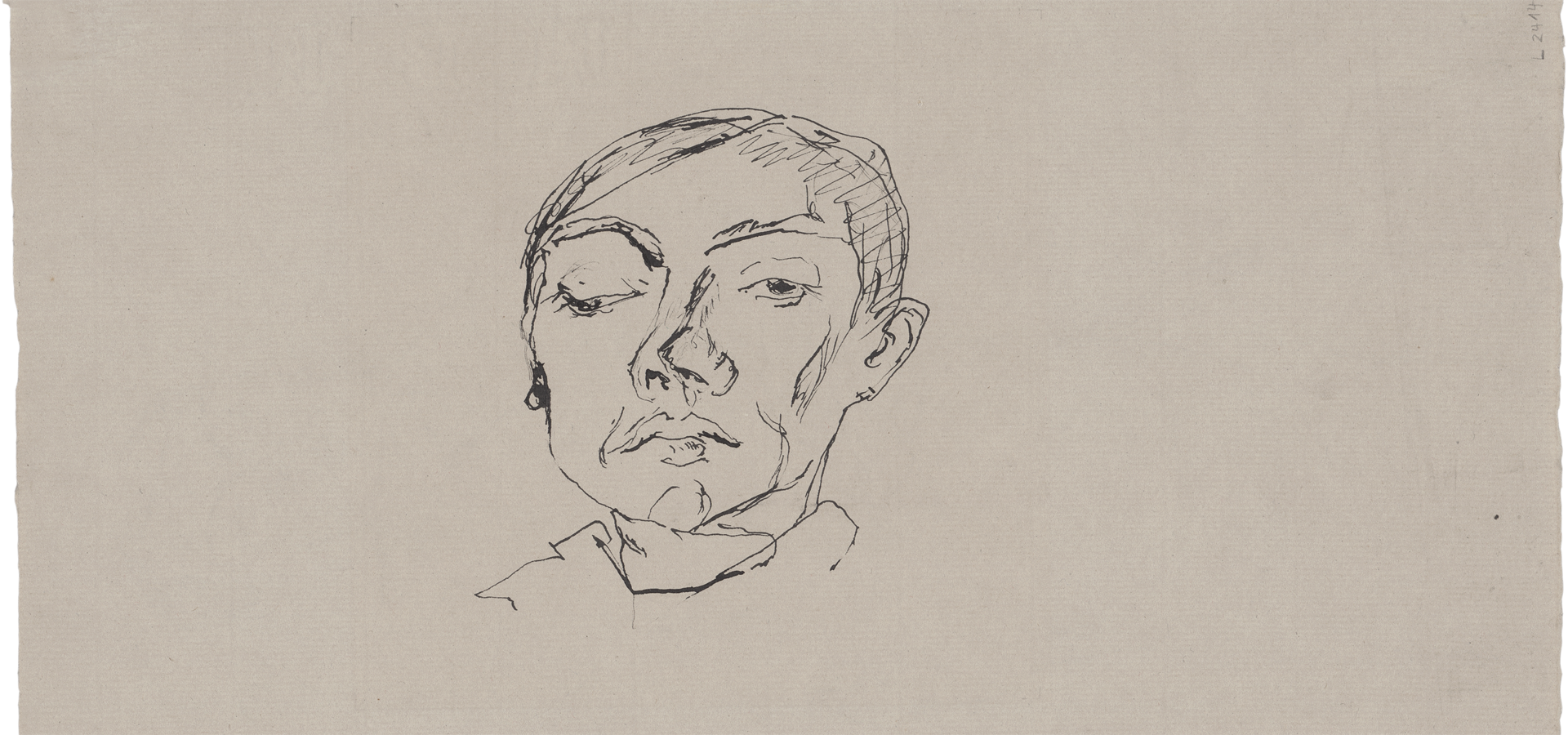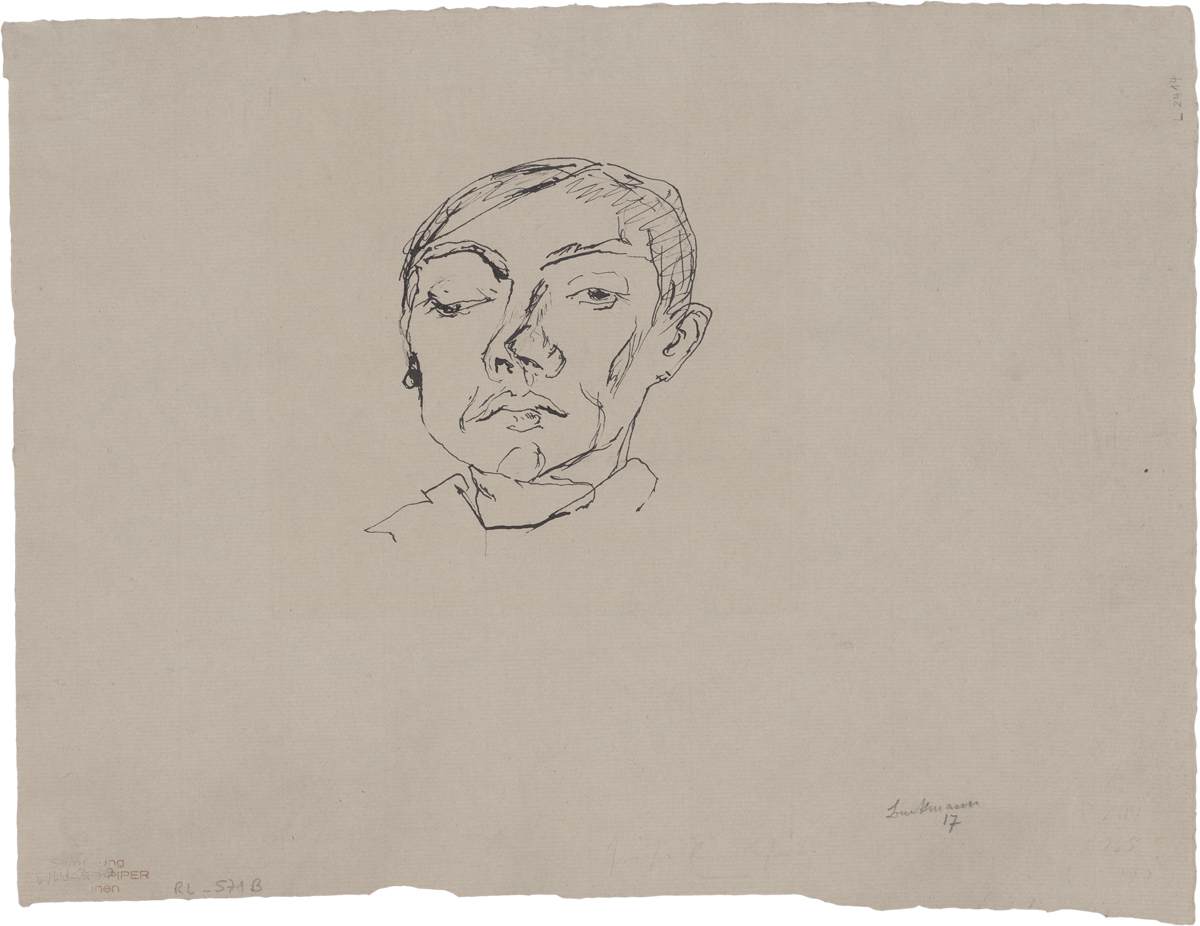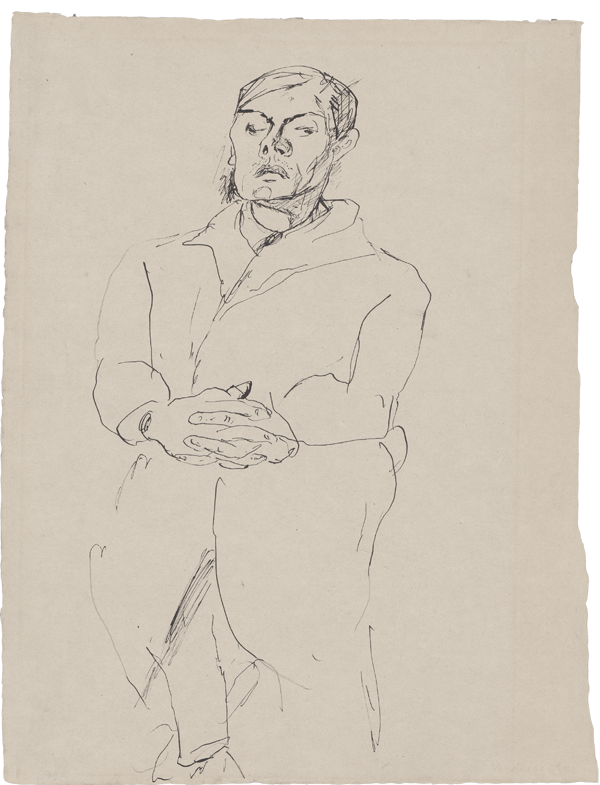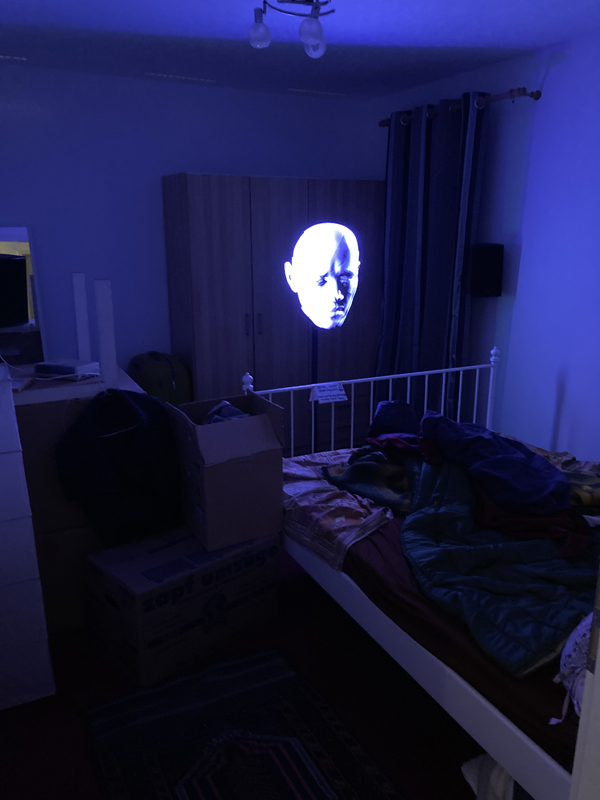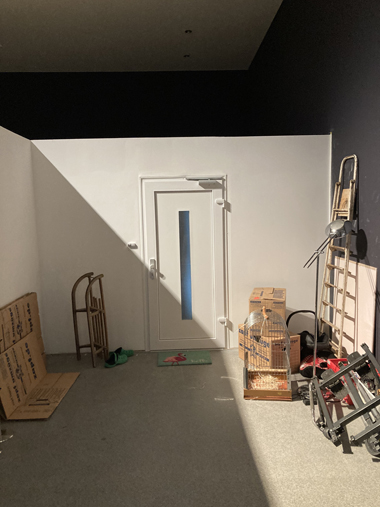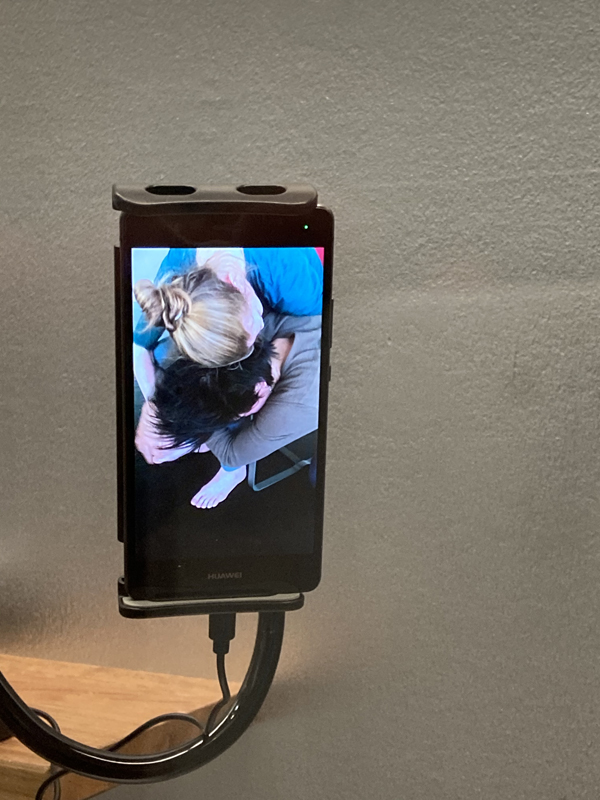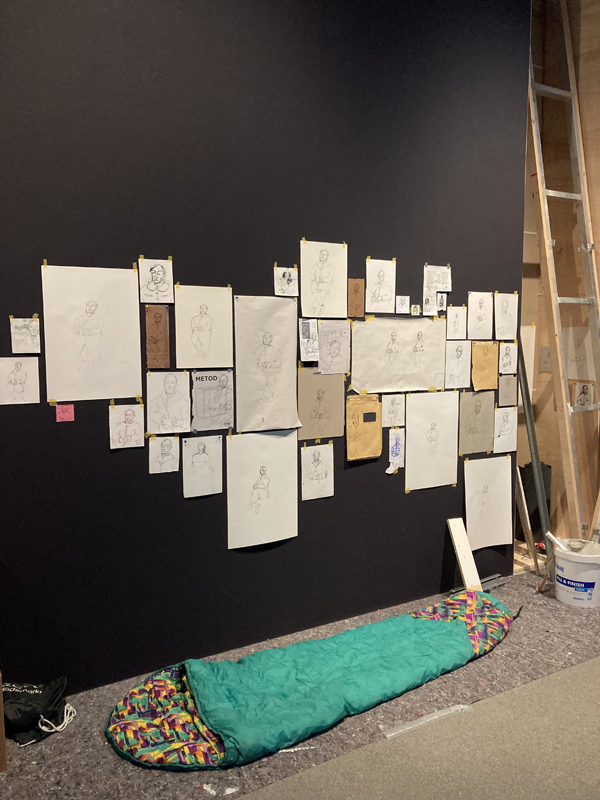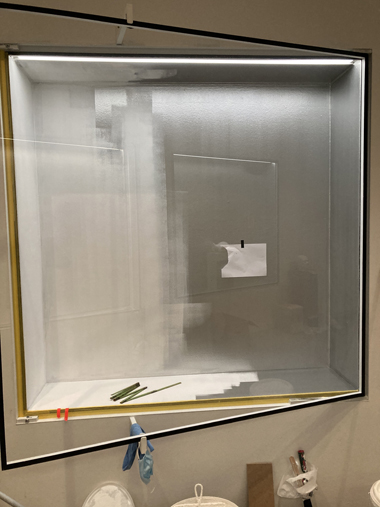Closing of the exhibition
Due to current circumstances in connection with the COVID-19 virus, the exhibition will be closed to visitors from Monday, 02.11.2020 until 30.11.2020.
We are thus following the decision of the Bavarian Ministry of Science and Art.
We hope to welcome you soon again in our exhibition.
The exhibition
For the first time, a single drawing is at the aesthetic crosslines of one of the sets of the internationally renowned filmmaker Omer Fast. Max Beckmann presents himself in his 1917 double-sided self-portrait as a convalescent war veteran. In 1915, after suffering a nervous breakdown, Beckmann was released from active military service as a medic. Two years later, it appears as though the visions of witnessed war crimes were haunting his mind and causing harm to his body as well. The visions make it hard for him to escape from his shattered world and return to an orderly and emotionally stable civilian life.
Omer Fast’s installation investigates this obviously precarious state between reality and madness in Beckmann’s portrait and carries it over to our own lives and visual experience.
Upon entering the corridor flanked by vitrines, formerly a parade ground for graphic art, appears deserted. The display cases solely hold relics from our daily life that look as if arranged by invisible hands and as if they had developed a life of their own. In a spot, where work seems to have just been dropped, a deserted mobile phone plays an obsessive private collection of images. It is uncertain if this display of digital data is a violation of privacy or the disclosure of a crime. Either way, this flood of images reminds us of our own addiction to images from beyond the analog world. In a second vitrine, a nearby sketch of a tied couple helps us decipher a film on a mobile phone as a re-enactment of the right panel of Beckmann’s menacing triptych Abfahrt (Departure, 1932–35).
This motif reflects the drama of flight from a catastrophic world into a promising future as Beckmann himself had experienced it and as hundred-thousands of people are experiencing it today. With this is mind, the exhibition’s title oscillates between bright hope and dark prophecy.
The adjoining apartment seems neither deserted nor inhabited. We cannot be certain if it is undergoing renovation or was departed for good and left to rot. In the living room the TV set shows the fabled story of a ghost that determines people’s fates. In the adjoining master and children’s bedrooms – formerly havens of safety – professional content managers and super recognizers talk about their work that is meant to protect our lives from the abysses of human imagination but that has thrown them off track in their own lives.
Upon leaving the apartment for the backyard, we are enveloped there by a cloud of countless Beckmann portraits. It is a mystery who created them. Apparently, past mental images are haunting this place like revenants. In the video room next door, which looks like the film still of a summer fete, another film tells a story that vacillates between dream and reality.
Omer Fast’s work Abfahrt is an offer to visitors to experience motifs of Max Beckmann’s life and art in a different manner and to check, in one spot or another, the faded matrix of the past against our own lives and experiences. At the end of the tour, we may ask ourselves if we still see Beckmann’s Self-portrait seated, hands folded as we did before.
Exhibition podcast [german]
Important Information
Please be advised that persons under 16 years of age (alone or in the company of adults) are not admitted in the exhibition due to sensitive content.
Due to Corona restrictions, only six visitors are admitted to the exhibition at any one time. This may cause a wait for those wishing to be admitted.
We apologize for any inconvenience.
Activate YouTube content
Please note:
With activating cookies, they are stored on your device and a connection to the USA is established. The USA is not a safe third country within the meaning of EU data protection law. With your consent, you also consent to the processing of your data in the USA. Further information can be found in our privacy policy.
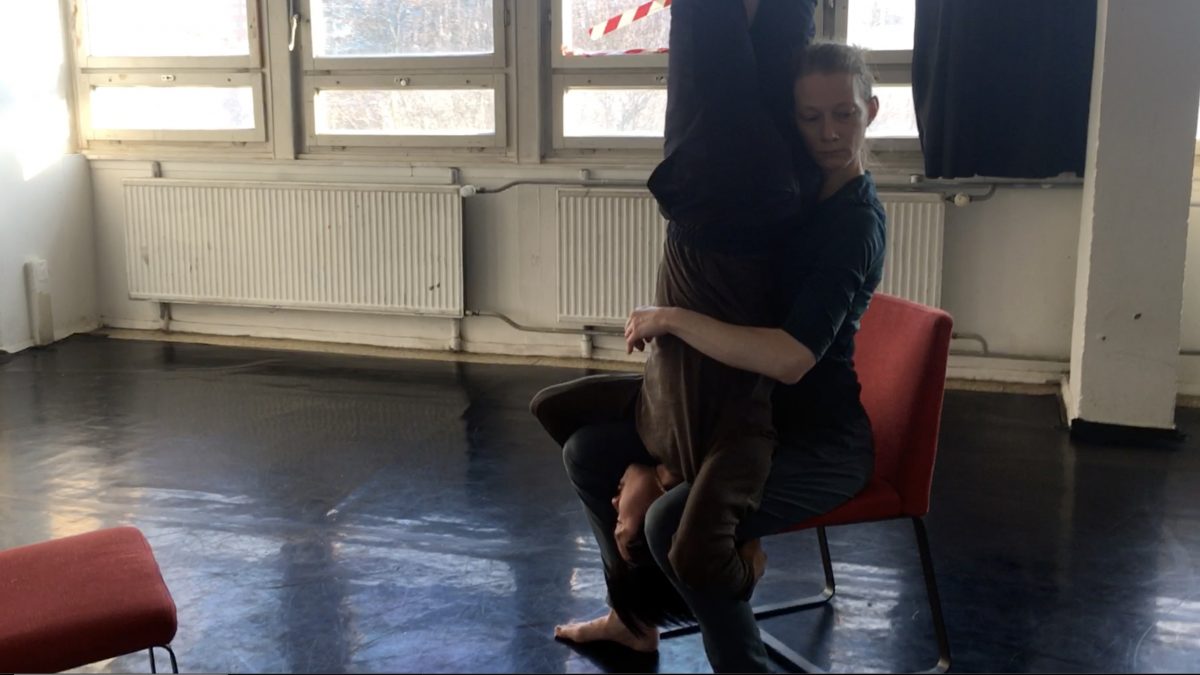
BECKMANN'S ROPE (2020)
Originally planned as a lavish, three-dimensional cinematic recreation of Max Beckmann's triptych "Abfahrt" (Departure), the project was intended as the centerpiece of my solo show at the Pinakothek der Moderne, but filming was canceled due to Covid-19.
This rehearsal filmed on an iPhone is what remains from the project. Two performers meet on a cold day in Berlin to recreate and rehearse a detail from Max Beckmann's painting.
The work is shown on a mobile phone.
Activate YouTube content
Please note:
With activating cookies, they are stored on your device and a connection to the USA is established. The USA is not a safe third country within the meaning of EU data protection law. With your consent, you also consent to the processing of your data in the USA. Further information can be found in our privacy policy.
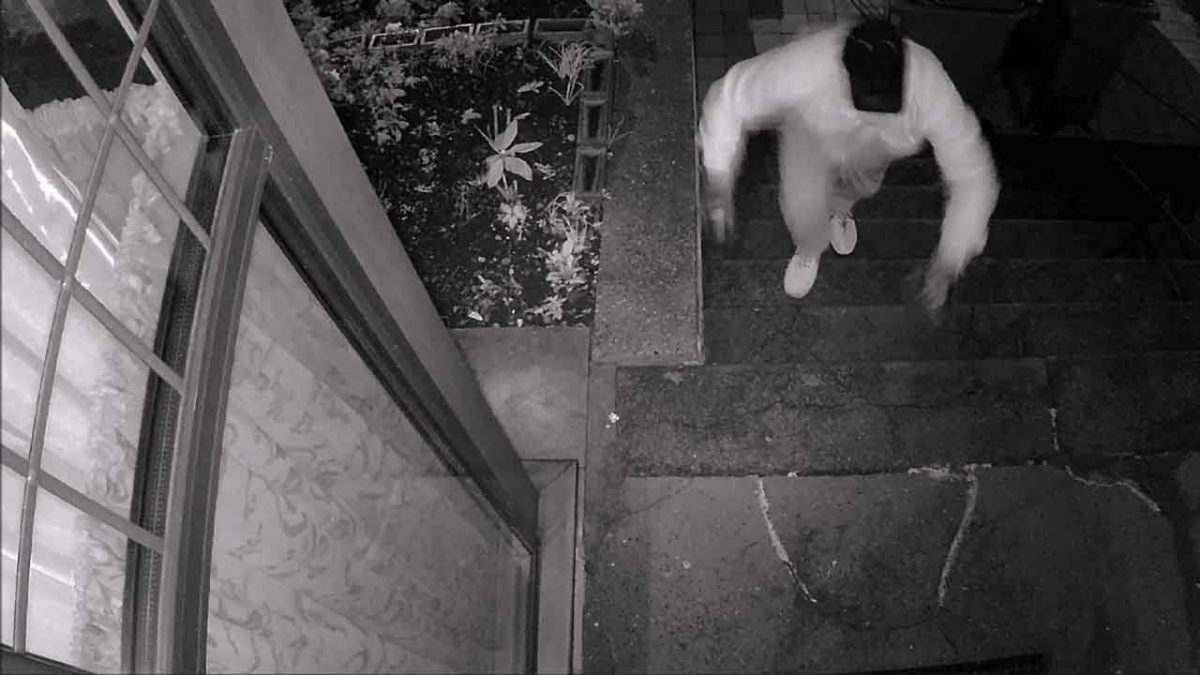
A PLACE WHICH IS RIPE (2020, english version)
A Place Which Is Ripe is edited from conversations with two former Scotland Yard police officers who talk about their work with video surveillance and facial recognition.
Their interviews were fed sentence by sentence to a Google image search, which yielded the images that accompany their words.
The work is normally shown on three mobile devices which play synchronously inside an open drawer. This preview file is a simulation.
The film was commissioned by the Staatliche Graphische Sammlung / Freunde der Pinakothek der Moderne for an exhibition in 2020.
KARLA (2020)
KARLA is based on a conversation with a content moderator for the world's largest online video sharing platform. The content moderator wished to remain anonymous and so his/her words were memorized by an actress, whose performance was then recorded using facial-capture technology.
As the actress speaks, both her face and voice gradually shift into different characters, refusing to coalesce into a single identity, while delving deeper and deeper into one person's nightmare of working with images in the gig economy.
There are two parts to this work: A holographic projection and a small flatscreen monitor. In this preview file, the two parts of the work have been edited onto the same screen.
Activate YouTube content
Please note:
With activating cookies, they are stored on your device and a connection to the USA is established. The USA is not a safe third country within the meaning of EU data protection law. With your consent, you also consent to the processing of your data in the USA. Further information can be found in our privacy policy.
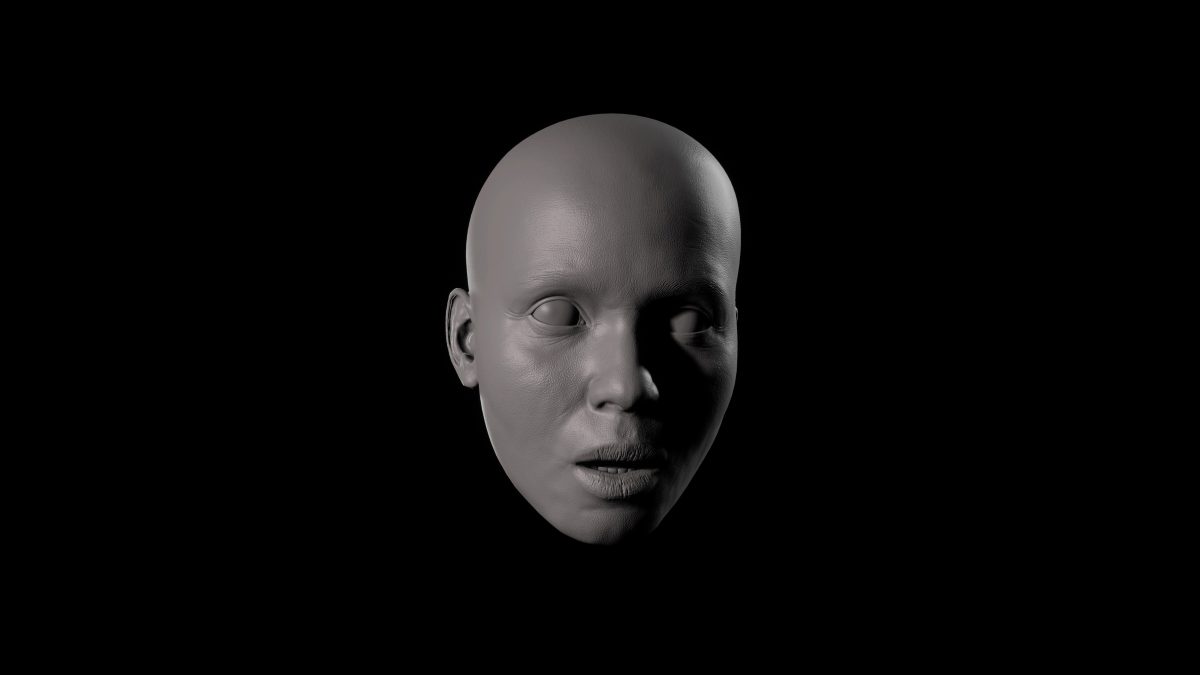
THE INVISIBLE HAND (2018)
This short film about a Chinese family's conflict with a ghost was commissioned by the Guangdong Times Art Museum, Guangzhou, China, in 2018. The film was premiered at the museum but shut down after two days following government censorship. Based on a medieval Jewish fairy tale, the film was shot in 360 degrees and 3D and can also be viewed in VR in its original version. This 2D file is for preview purposes only.
Activate YouTube content
Please note:
With activating cookies, they are stored on your device and a connection to the USA is established. The USA is not a safe third country within the meaning of EU data protection law. With your consent, you also consent to the processing of your data in the USA. Further information can be found in our privacy policy.
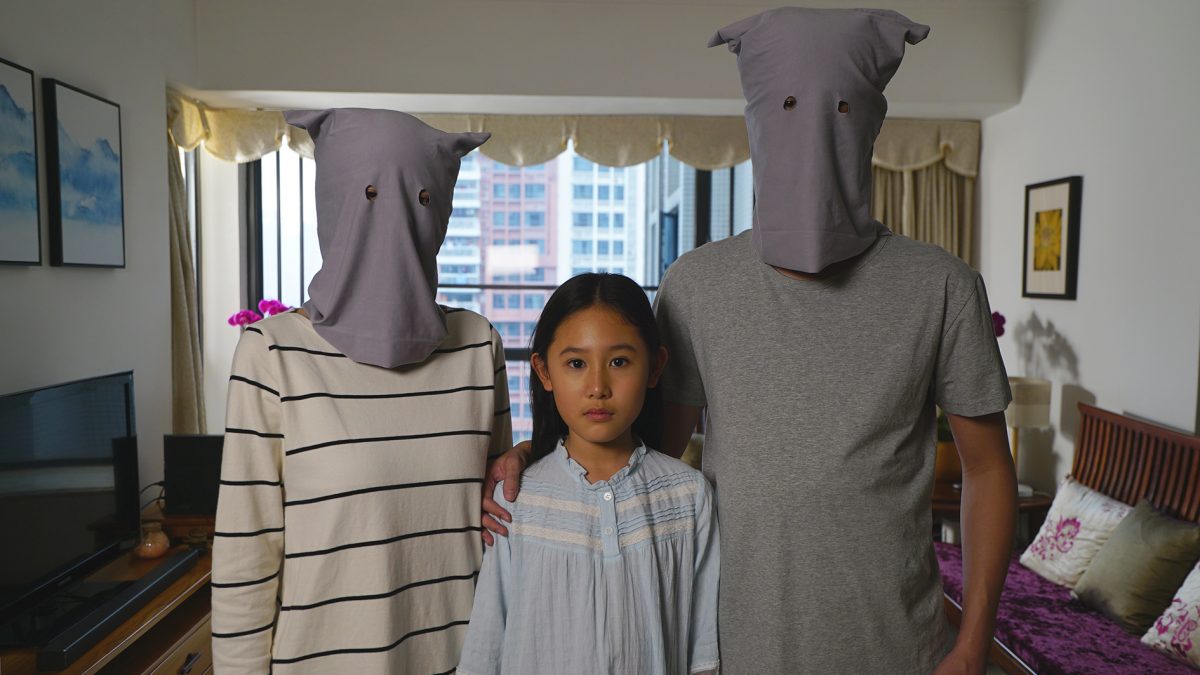
DE OYLEM IZ A GOYLEM (2019)
A lone skier encounters an unexpected passenger on a lift high above the Austrian Alps. Based on a medieval Jewish fairy tale, the 24-minute film was commissioned by the Salzburger Kunstverein in 2019.
Activate YouTube content
Please note:
With activating cookies, they are stored on your device and a connection to the USA is established. The USA is not a safe third country within the meaning of EU data protection law. With your consent, you also consent to the processing of your data in the USA. Further information can be found in our privacy policy.
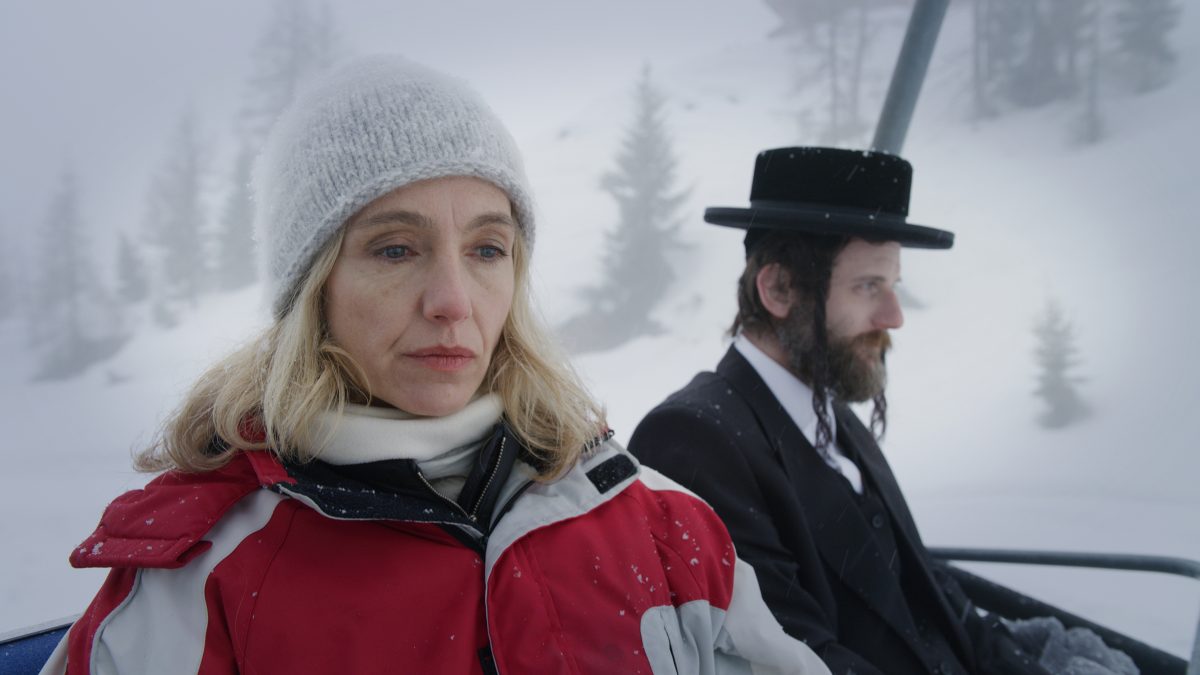
CREDITS
Abfahrt
A solo exhibition by Omer Fast
Commissioned by Michael Hering, Direktor, Staatliche Graphische Sammlung, München
Scenography: Heike Schuppelius
Scenography Assistance: Anna Knöller
AV Technician: Radek Pater
Ausstellungsaufbau: Karl-Heinz Francota Staat, Joe Hölzner, Rafael Diaz Noguero, Bernhard Eglmeier
Builder: Rafal Schmidt, Slawek Kwasny, Slawek Piech, Andrzes Kosek, Sylwester Oayva
Guston Sculpture reproduction: Julia Heppner, Sophie Ilg
Installation assistance: Laurel Severin
Research assistance: Jonas Beile
Pedestals: Christian Veit
AV Equipment: Eidotech GmbH
Full 3D Productions: Mimic Productions, Berlin
Danke an Frieder Schlaich, Anna Bitter und Irene von Alberti / Filmgalerie 451, Berlin
Danke an die Bayerische Staatsoper und Münchner Kammerspiele für die Unterstützung mit Requisiten
Der besondere Dank gilt den Freunden der Pinakothek der Moderne für die generöse Unterstützung.
Film Works
Holes
Video Collage/Found Images playing on a mobile phone, 5:00 min, 2020
Beckmann’s Rope
Video playing on mobile phone, 4:33 min, 2020
Performers: Ardian Hartono, Nadine Milzner
Choreography: Shiran Eliaserov
Music: A S S (Jochen Arbeit, Günther Schickert, Dirk Dresselhaus)
Idea, camera and edit: Omer Fast
Based on two figures in Max Beckmann’s triptych Abfahrt (1932-35)
A Place Which Is Ripe
3 Videos playing on mobile devices/Performance and found Images, 16:39 min, 2020
Based on interviews with Mike Neville and Dale Nufert
Idea and edit: Omer Fast
Performers: Bernhard Schütz, Stefan Kolosko
Camera: Frieder Schlaich
Production/Translation: Anna Bitter
Sound Post-Production: Jochen Jezussek
Karla
Holographic projection and HD video, 34:45 min, 2020
Based on an interview with a person who wishes to remain anonymous
Idea and edit: Omer Fast
Performer: Genia Maria Karasek
HD Camera and sound: Frieder Schlaich
Sound Post-Production: Jochen Jezussek
Production/Translation: Anna Bitter
Full 3D Production: Mimic Productions, Berlin
Hermione Mitford, David Bennett
Alexandria Frances Petrus, Production Coordinator
Alexandre Donciu-Julin, Motion Capture Director
Johannes Mittig, Render Artist and Technician
Yeji Min, Animator
Matilde Hansen-Walmsness, Animator
Angus McDonald - Animator
The Invisible Hand
VR Film transferred to HD, 11:30 min, 2018
Commissioned by the Guangzhou Times Art Museum
Written and Directed by Omer Fast
Executive Producer: Nikita Yingqian Cai
Performers:
The Young Girl: Zhang Yanqi
The Ghost: Zhao Heng
The Bride: Hu Bindan
The Groom: Jiang Guikai
The Young Boy: Lan Di
The Boy’s Mother: Lei Lei
The Boy’s Father: Zhang Di
The Grandmother: Li Hongmei
The Grandfather: Li Fei
The Finger: Wang Shuai
The Wedding MC: Zhao Yongliang
Office Staff: Li Luyao, Lin Xiahui, Pan Siming, Wang Lili, She Pingjie, Tan Yue, Yang Beichen, Yu Jieshi, Zhao Yilong, Zhou Yuxian
Customers Café: Nikita Yingqian Cai, Mo Zhensheng, Ou Xin, Vega Fang, Tan Lijie, Yang Beichen
Director of Photography: Stefan Ciupek
Associate Producer: Tan Yue
Editors: Omer Fast and Janina Herhoffer
Music: Dirk Dresselhaus
Sound Designer: Jochen Jezussek
Assistant Director: Ou Xin
Production Manager: Ou Guiliang
Production Designer: Tan Lijie
Set Decorator/Props: Tan Nianping
Camera Operator: Zhao Yilong
1st AC: Vega Fang
DIT: Huang Weiyin, Xie Junyao
Boom Operators: Huang Biaoqun, Li Luxiang
Gaffers: Ouyang Weiwei, Li Yunqing
Lighting Assistants: Liu Lun, Xu Guiqing, Wang Ming
Best Boys: Wang Shuai, Xiao Peng
Costume: Mo Chen
Makeup Artist/Hairstylist: Ying Huajian
Colorist: Luna Larrea
Grading Support: Dirk Meier, Colja Krugrmann
VFX Supervisor: Jean Michel Boublil
Compositing Supervisor: Gilberto Arpioni
Compositing Artist: Patrick Tauscher
Rotoscoping Artist: Andrea Paracchino
Matte Painting: Alina Axt
Stills Photographer: Vega Fang, Mo Zhensheng
Translation Assistance: Xi Bei
Technical Support: Till Beckmann
Thanks to Nikita Yingqian Cai, James Cohan, David Norr, Nathalie Boutin, Solene Guillier
Technical Support and sponsorship: Jaunt
Special Thanks: Guangzhou JIMI Network Technology Co., Ltd
Tangchu Restaurant (唐厨房2号)
Huangbian Village(黄边村联社)
ART CHEF(春园)
Tan Weixuan (Andy)
De Oylem iz a Goylem
Digital Film Projection, 24:39 min, 2018
Commissioned by the Salzburger Kunstverein
Supported by: James Cohan Gallery, New York, The Ishiwaka Foundation, Osaka, Taro Nasu Gallery, Tokyo
Performers:
The Skier: Ursina Lardi
The Jew: Luzer Twersky
The Goldsmith: David Ketter
The Demon: May Garzon
The Wife: Genia Maria Karasek
The Rabbi: Thomas Forsthuber
The Resort Employee: Anna Unterweger
Written, directed and edited by Omer Fast
Producer: Seamus Kealy
Line Producer: David Neumayr
Creative Producer: Sebastian Wimmer
Director of Photography: Stefan Ciupek
1st Assistant Camera: Jana Fitzner
2nd Assistant Camera: Roman Müllers
Gaffer: Chris Böck
Electrician: Sebastian Otte
Best Boy: Finn Gosch
Key Grip: Clemens Bachmann
Grip: Jan Haller
Production Designer: Danja Katzer
Set Decorators: Sam Beyglikli, Sophie Thammer
Costume Designer: Simone Monu
Makeup and Hair Designer: Marie Schreiber
Sound Engineer: Philip Preuss
Sound Assistant: Christian Höll
Sound Designer: Jochen Jezussek
Rerecording Mixer: Matthias Schwab
Colorist: Artem Stretovych
Technical Support: Till Beckmann
Music by Angel (Ilpo Väisänen and Dirk Dresselhaus)
Visual Effects by Automatik VFX
VFX Supervisor: Jean-Michel Boublil
VFX Producer: Alice Rathert
VFX Coordinator: Katarzyna von Matthiessen
Compositing Artists: Florian Obrecht, Daniel Binder, Patrick Tauscher
Matte Painting Artist: Alina Axt
3D Artist: Christian Bahr
Postproduction Lab The Post Republic
General Manager: Michael Reuter
Inhouse Producer: Petra Kader-Göbel
Mixing Assistant: Maxim Romasevich
Head of Audio Department: Markus Wurster
Production Assistants: Katrin Petter, Anita Simic
Production Office Coordinator: Lucas Triebl
Production Administration: Simona Gaisberger
Location Assistance: Michaela Lederer
Set Runners: Laurenz Wakolbinger, Fabian Rausch
Yiddish translation: Lia Martyn
German translation: Stephanie Fezer
Historical advisor: Alfred Römer, Goldschmiedemuseum, Vienna
Filmed at: Bergbahnen Werfenweng GmbH, Travel Charme Werfenweng GmbH, Salzburger Freilichtmuseum, Hotel Schloss Leopoldskron
Special thanks to: Salzburg Festival and Jan Meier, Christl Urlasberger, Theo Deutinger, Bernhard Stangl, Daniela Milles, Georg Hollersbacher, Gemeinde Mauterndorf, Freiwillige Feuerwehr Mauterndorf, Manuel Uguet, Margit Rummersdorfer, Michael Weese, Sandra Berger, Thomas Biebl, Daniel Szelényi, Thomas Buchholz, Markus Buchhagen & Manuel Uguet from Travel Charme Hotel, Werfenweng; and everyone at the Werfenweng Ski Resort.
The song Meil aiaäärne tänavas was written and performed by Reet Hendrikson based on lyrics by Lydia Koidula. © Reindeer Records. Special Thanks to Andres Raudsepp
Planning your visit
Open today till 6.00 pm
Daily 10.00 – 18.00
Thursday 10.00 – 20.00
Monday closed
Barer Straße 40
80333 München
Sunday admission 1€
Thursday – Saturday 10€
reduced 7€
Day pass (Alte Pinakothek, Pinakothek der Moderne, Museum Brandhorst, Sammlung Schack) 12€
